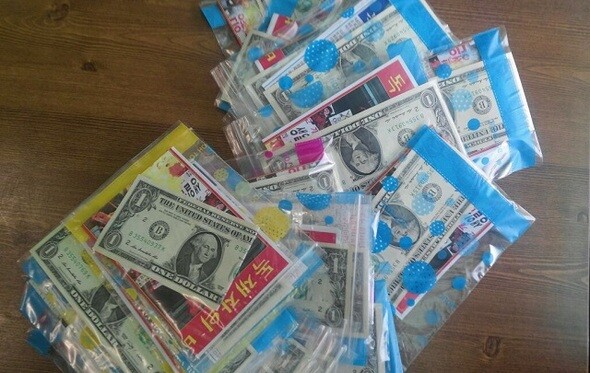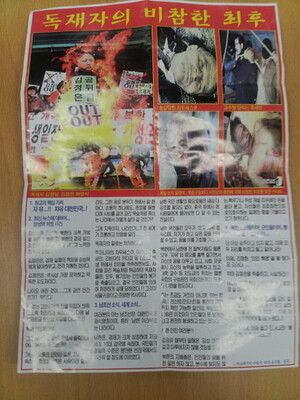hankyoreh
Links to other country sites 다른 나라 사이트 링크
Anti-North Korea leaflets contain what could be illegal messages

Propaganda leaflets have turned into the single biggest issue in inter-Korean relations. In addition to raising doubts about the prospects of a planned second round of high-level talks, they have also sparked a war of words between authorities in the North, who insist the balloon launches must be stopped before any dialogue, and those in the South, who defend what they are calling the “freedom of expression” of the groups launching them.

Most of the leaflets being sent by North Korean refugee groups include messages that compare North and South Korea and list the superior virtues of the South Korean system. Typically, they paint a picture of a free and abundant South, contrasted against an exaggerated portrayal of the dictatorial and oppressive rule and immorality of North Korean leader Kim Jong-un and his family.
Now, in a discovery that is expected to further fan the controversy, it has been learned that some of the leaflets also contain messages that could be considered in violation of South Korean law. The content goes beyond “freedom expression” to include defamation and falsehoods, including charges that late former South Korean President Roh Moo-hyun was a “fraudster.”
On Oct. 25, the group Public Alliance for Sending Leaflets to North Korea attempted a balloon launch at the Imjingak resort in Paju, Gyeonggi Province. The leaflets in question included the message, “The electronic voting fraudster Roh Moo-hyun and the traitorous enemy abettor Kim Dae-jung, in their loyalty to their master Kim Jong-il, handed over tens of billions of dollars and tens of millions of tons of rice, corn, and wheat. Where has it all gone?”
The reference to Roh being involved in electronic voting machine fraud during the 2002 presidential election may be considered an example of spreading false information according to South Korea law.
In revealing the content of the leaflets during an Oct. 27 parliamentary audit of the Ministry of National Defense, New Politics Alliance for Democracy lawmaker Yoon Hu-duk questioned whether authorities in Seoul may have abetted the act.
“Some of the leaflets disseminate false information,” Yoon said. “Is this also considered ‘freedom of expression’?”
Other refugee groups conducting leaflet distributions also criticized the methods as misguided.
“These leaflets with provocative content are being made by certain extreme conservatives from a South Korean background,” said Lee Min-bok, head of the group Campaign for Helping North Korean in Direct Way.
“Rather, the only thing sending those messages will do is encourage a reaction from North Koreans,” Lee warned.
Seoul continues to stand by its position that the leaflets are protected by freedom of expression. The groups themselves have not made any public announcements about launches recently - may have something to do with northerly winds that will make them more difficult from next month on.
But it appears unlikely that inter-Korean relations will rebound any time soon from the tense exchange over the leaflets on Oct. 28 and 29.
By Choi Hyun-june, staff reporter
Please direct questions or comments to [english@hani.co.kr]

Editorial・opinion
![[Column] Park Geun-hye déjà vu in Yoon Suk-yeol [Column] Park Geun-hye déjà vu in Yoon Suk-yeol](https://flexible.img.hani.co.kr/flexible/normal/500/300/imgdb/original/2024/0424/651713945113788.jpg) [Column] Park Geun-hye déjà vu in Yoon Suk-yeol
[Column] Park Geun-hye déjà vu in Yoon Suk-yeol![[Editorial] New weight of N. Korea’s nuclear threats makes dialogue all the more urgent [Editorial] New weight of N. Korea’s nuclear threats makes dialogue all the more urgent](https://flexible.img.hani.co.kr/flexible/normal/500/300/imgdb/original/2024/0424/7317139454662664.jpg) [Editorial] New weight of N. Korea’s nuclear threats makes dialogue all the more urgent
[Editorial] New weight of N. Korea’s nuclear threats makes dialogue all the more urgent- [Guest essay] The real reason Korea’s new right wants to dub Rhee a founding father
- [Column] ‘Choson’: Is it time we start referring to N. Korea in its own terms?
- [Editorial] Japan’s rewriting of history with Korea has gone too far
- [Column] The president’s questionable capacity for dialogue
- [Column] Are chaebol firms just pizza pies for families to divvy up as they please?
- [Column] Has Korea, too, crossed the Rubicon on China?
- [Correspondent’s column] In Japan’s alliance with US, echoes of its past alliances with UK
- [Editorial] Does Yoon think the Korean public is wrong?
Most viewed articles
- 1‘We must say no’: Seoul defense chief on Korean, USFK involvement in hypothetical Taiwan crisis
- 2[Reportage] On US campuses, student risk arrest as they call for divestment from Israel
- 3[Column] Park Geun-hye déjà vu in Yoon Suk-yeol
- 4‘Weddingflation’ breaks the bank for Korean couples-to-be
- 5Korea sees more deaths than births for 52nd consecutive month in February
- 6N. Korean delegation’s trip to Iran shows how Pyongyang is leveraging ties with Moscow
- 7Amnesty notes ‘erosion’ of freedom of expression in Korea in annual human rights report
- 8Will NewJeans end up collateral damage in internal feud at K-pop juggernaut Hybe?
- 9N. Korean hackers breached 10 defense contractors in South for months, police say
- 10[Guest essay] The real reason Korea’s new right wants to dub Rhee a founding father